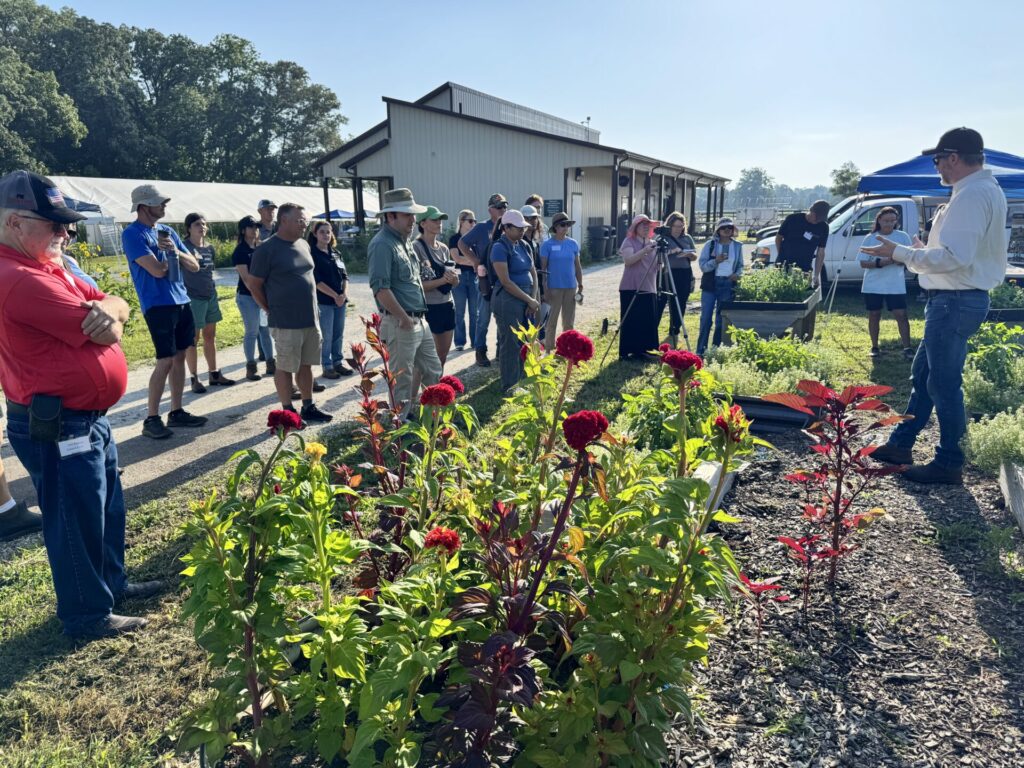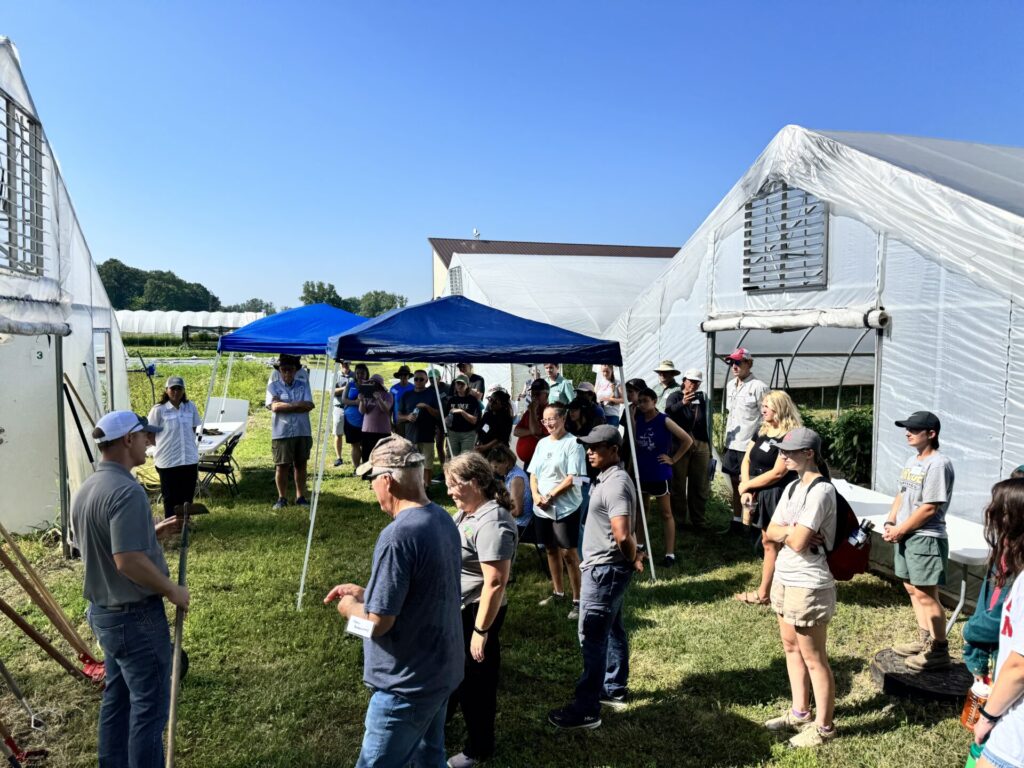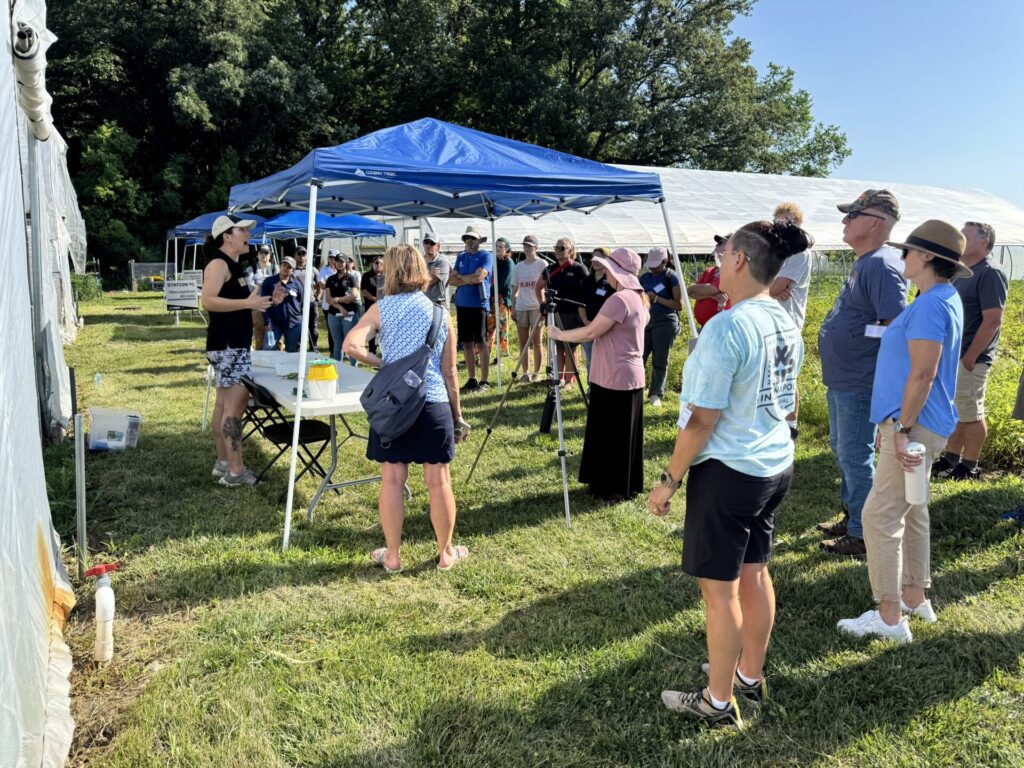The Purdue Small Farm Education Field Day proved that dedicated growers won’t let summer temperatures dampen their enthusiasm for learning. Despite the hot weather, 63 attendees gathered at the Purdue Student Farm yesterday to participate in comprehensive demonstrations and presentations focused on small-scale farming solutions.
The event, co-hosted by the Department of Horticulture and Landscape Architecture and the Purdue Student Farm, ran from 9 a.m. to 1 p.m. and featured expert-led demonstrations covering critical aspects of small-scale vegetable production.
Comprehensive Educational Programming
Crop Production and Variety Selection sessions provided growers with research-backed insights into optimizing their operations. Petrus Langenhoven presented findings from the 2024 sweet pepper variety trial, sharing performance data from 10 varieties tested for high tunnel production in Midwestern conditions. The raised bed demonstration, led by Nathan Shoaf, explored various materials, configurations, and heights, helping attendees understand the trade-offs between benefits, such as improved drainage, and challenges, including increased costs and labor demands.

Figure 1. Nathan Shoaf talking about the use of different materials to construct raised garden beds (Photo by Petrus Langenhoven).
Equipment and Tool Management demonstrations provided participants with hands-on experience using essential farming implements. Ashley Adair demonstrated to attendees how to calibrate an Earthway seeder for precise sidedressing of poultry-based fertilizers. The popular “Hoes 101” session, presented by Stephen Meyers and Celia Corado, taught proper maintenance and use of various hand-weeding tools, with many participants bringing their own implements for sharpening practice.

Figure 2. Stephen Meyers discusses different options for weed management (Photo by Petrus Langenhoven).
Integrated Pest Management and Food Safety sessions addressed critical operational concerns. Laura Ingwell demonstrated the use of pheromone-baited traps for monitoring tomato pinworm populations, a relatively new pest challenge in Indiana’s high tunnel tomato production. Amanda Deering led discussions on packinghouse design strategies to prevent cross-contamination and implement effective food safety protocols for operations of all sizes.
Innovative Growing Systems highlighted cutting-edge approaches to sustainable production. Miranda Purcell showcased the performance of Mars and Canadice grape varieties under high tunnel conditions, demonstrating how protected cultivation can decrease time to production while increasing yields. Barrett Wilson’s hydroponic shipping container farm demonstration introduced attendees to controlled-environment agriculture using Freight Farms technology.
Sustainable Agriculture Research sessions featured ongoing projects exploring innovative farming approaches. Moriah Bilenky and Keirstyn Amponsah presented preliminary results from research evaluating sunn hemp as a cover crop for no-till garlic production, highlighting the crop’s potential for weed suppression and nitrogen provisioning. A companion presentation by Moriah Bilenky, Jose Cabezas, and Hannah Robalino explored Integrated Crop Livestock Systems, specifically examining how goats can be used to prepare vegetable beds compared to traditional tarping or tilling methods.
Practical Solutions and Farm Hacks rounded out the programming with Jane Pickey and Student Farm interns sharing innovative solutions designed to enhance productivity, efficiency, and sustainability on small-scale operations.
Research-Based Impact
“This field day creates a vibrant hub where small farm operators and urban growers from across Indiana converge,” said Petrus Langenhoven, Purdue Student Farm director. “We’ve consistently seen participants implement specific techniques learned here to enhance their own farms and urban gardens. Often, it’s the nuanced practices that dramatically transform the productivity and sustainability of small-scale agricultural operations.”
The event’s success demonstrates the strong demand for research-based, practical education among Indiana’s small-scale farming community. Attendees included market gardeners, commercial growers, agricultural educators, and beginning farmers, all seeking evidence-based solutions to common production challenges.
Looking Forward
The enthusiasm shown by attendees, despite challenging weather conditions, underscores the value of hands-on agricultural education and the importance of connecting research with practical application. The Purdue Student Farm remains a vital resource for Indiana’s small-scale farming community, bridging the gap between university research and real-world agricultural challenges. We hope to see you in 2026!
For more information about Purdue Extension’s small farm programming and upcoming educational opportunities, visit the Purdue Extension website or contact your local Extension office.
